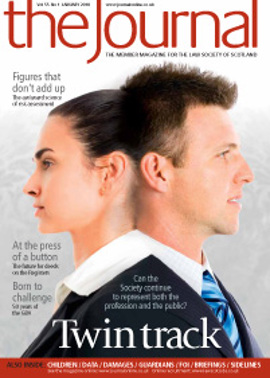Working for the estate

This note reflects the author’s experience of assisting with a substantial and complicated executry. The deceased had owned a fairly large estate and had employed two workers whose services remained necessary for its maintenance. Who now employed and paid them, and were there any other obligations?
Death extinguishes contracts, including those of employment. As executors hold a deceased’s estate in trust for its beneficiaries, only they can enter into new contracts of employment. A third party, such as a beneficiary, can pay workers, but it is considered better and more robust practice for executors to be both employers and responsible for remuneration.
New particulars
An employee is entitled to a statement of particulars of employment (SPE), in terms of the Employment Rights Act 1996, within two months of taking up a job. This must include details of disciplinary and grievance procedures. The penalty a tribunal can impose for failure to comply with this legislation is in the range of two to four weeks’ pay, at present capped at £330 per week. It is prudent to issue an SPE as quickly as practicable, as the unexpected is more often than not to be expected in complex executries.
SPEs require to include the full names of the executors, a full job description detailing the principal duties, remuneration including method and interval of payment, place of work, starting date, days and hours of work, meal breaks and holidays. Provision for sickness absence and pension arrangements should also be specified. Normal termination procedures apply, but it is possible to draft a contract for a fixed period or indeed to end on the sale of a heritable asset.
If tied accommodation is involved, it is necessary to ensure that only a licence to occupy is issued, to avoid creating an unintended assured tenancy.
This can be an anxious time for existing employees and it can help ease the transition for all concerned if any new contract is modelled as closely as possible on the old one.
Taxing matters
Compliance with national minimum wage regulations is essential and it is necessary to check each employee’s hours, taking care to establish whether or not any breaks, such as meal breaks, are remunerated. Any cash payments must be subsumed within the employee’s salary to establish if it is then over the threshold for PAYE or NIC. If it transpires that it is, executors would be well advised to establish if this was also the case in any previous year.
Similarly, tied accommodation is eligible for exemption from a charge to tax only if the occupant is in a full time caretaking job and the accommodation is essential to its proper performance. The indications are that the courts apply these tests rigorously.
If accommodation does not qualify for exemption, its cash equivalent must be aggregated with the employee’s other earnings and taxed as a P11D benefit. The same principle applies to any other benefits in kind, which not uncommonly include the subsidy of council tax and utility bills.
Should any underpayment of PAYE and/or NIC emerge, full disclosure is advisable. With the introduction of new investigative and penalty rules, non-compliance, like marriage, is not lightly to be contemplated. HMRC will calculate anything that is still due and the correct ongoing payments. Executors should take the opportunity to register as employers with HMRC, bearing in mind their obligation to pay class 1A NICs.
Termination
Employees have a right to one week’s notice of termination of employment for every year’s service. This does not preclude executors electing for a longer period. There has to be a valid and justifiable reason for terminating a worker’s employment, and after one year’s service statutory procedures must be followed.
Postscript
A short article of this sort can highlight only some of the issues that may arise in administering the estate of a deceased who had personal employees. More detailed guidance should, where necessary, be obtained from specialist tax and employment advisers who can be contacted via the Law Society of Scotland’s website.
Iain Sim, solicitor
In this issue
- Forward thinking
- Renewal of transitional guardianships
- End the navel-gazing
- Who speaks for lawyers?
- Reasons to be hopeful
- The full picture
- Hearing and speaking
- Law of unintended consequences
- More prejudicial than probative?
- One giant leap
- If the cap fits
- Half a century of strife
- From the Brussels office
- Law reform update
- Send in the SaaS
- Ask Ash
- Words and sentences
- Two in one
- Enough to turn you to drink
- Uncertain security
- Protections with legs
- Working for the estate
- Home defences
- Splitting from the taxman
- Scottish Solicitors' Discipline Tribunal
- Website review
- Book reviews
- Route to freedom
- Steady as she goes is market forecast






